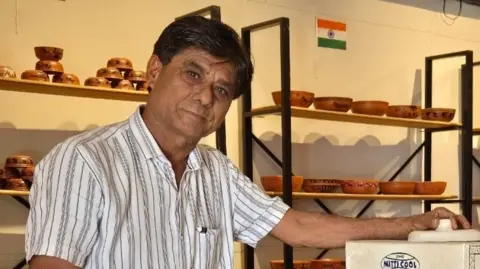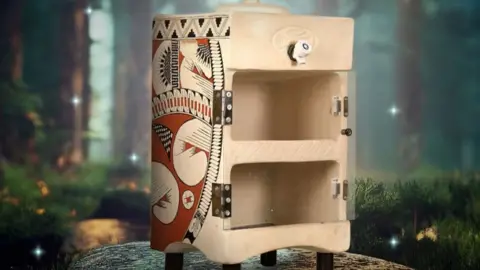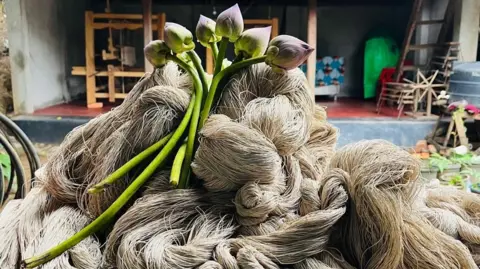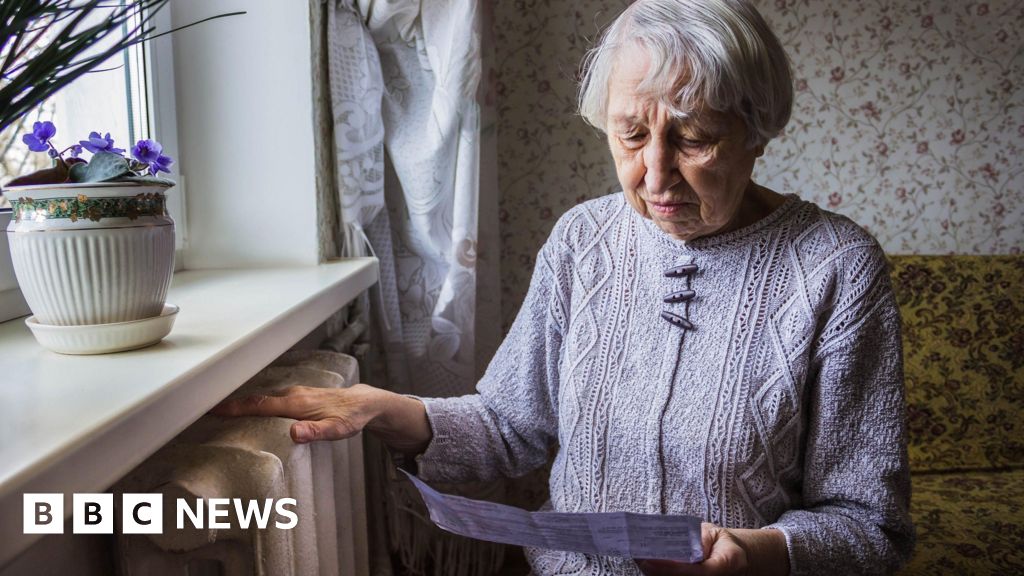ARTICLE AD BOX
Devina Gupta
Business reporter
Reporting fromNew Delhi

 Mansukh Prajapati
Mansukh Prajapati
An earthquake changed the life of Mansukh Prajapati
For Mansukh Prajapati, childhood in the western Indian city of Morbi began before sunrise, with a six-mile walk to collect clay for their family business.
"My father was a potter," he recalls.
Often he would wake up to the rhythmic sound of his father at work at his potter's wheel.
"My mother and I would get up at four in the morning and walk for miles every day to get clay."
Used for storing water, clay pots were a common item in Indian households in the 1970s.
But the income from making pots was meagre and the profession also came with social stigma.
"Nobody wanted to their daughter married in a potter's family," Mr Prajapati says. "They feared she will be burdened with endless labour."
Aged 31, a natural disaster marked the turning point for Mr Prajapati.
The devastating earthquake that hit Gujarat in 2001 destroyed his family home and left a pile of smashed clay pots in the courtyard.
"A local reporter wrote that 'the poor people's fridge is broken'," Mr Prajapati says.
"Clay pots keep water cool in the summer, so they are just like a fridge. The thought got stuck in my head. So, I decided to make a fridge out of clay that doesn't need electricity."
With no formal training, Mr Prajapati started experimenting with designs and materials.
"I first tried to make it like the modern fridge and even added a water tank, but nothing worked', he says.
"At one point I had $22,000 (£17,000) in loans and had to sell my house and small workshop. But I knew I had to keep going."
It took four years of tinkering to come up with a design that worked - a small clay cabinet with a water talk on the top and storage shelves below.
As water trickles through the cabinet's porous clay walls, it naturally cools the interior.
Mr Prajapati says it can keep fruit and vegetables fresh for at least five days - no electricity needed.
He named it MittiCool or the clay that stays cool.
At $95 its affordable and now sold through 300 stores in India and exported to countries including the UK, Kenya, and UAE.
"Fridges are a dream for many poor families," Mr Prajapati says. "And such dreams should be within reach."

 MittiCool
MittiCool
The affordable MittiCool fridge is made from clay
Mr Prajapati's innovation is part of a growing wave of grassroots entrepreneurship in India, driven by necessity.
Prof Anil Gupta who runs the Honeybee Network, a platform for supporting such ventures, call these "frugal innovations".
"It is a mindset," says Prof Gupta.
"Frugal innovation is about making solutions affordable, accessible, and available. Many of these innovators don't have formal education but are solving real world problems."
It's difficult to put a number on such businesses, as there has never been an in-depth study.
Prof Gupta says such start-ups are crucial because they provide jobs in rural areas and start a cycle of economic change.
For example, Mr Prajapati now employs 150 people in his workshop and has branched out into cookware, clay water filters and is experimenting with homes made of clay.

 Bijayshanti Tongbram
Bijayshanti Tongbram
Botanist turned entrepreneur Bijayshanti Tongbram shows the fibres in lotus stems
Another start-up that's hoping for similar success, is run by Bijayshanti Tongbram in the northeastern state of Manipur.
She lives in Thanga village which is home to one of India's largest freshwater lakes, Loktak.
Here lotus flowers bloom in abundance.
"People in my village use the petals of lotus flowers for religious offerings. But their stems often go to waste and that's what I wanted to change and thought of doing something sustainable," she says.
A botanist by profession, Ms Tongbram developed a way to extract silk-like fibres from the lotus stems and now leads a team of 30 women in her village who spin the threads into a yarn and weaves them into unique scarves and garments.
"It takes two months, and 9,000 lotus stems to make one scarf," she says.
Ms Tongbram pays the women $80 a month.
"This isn't just about fashion. I am giving women in my village a chance to do something other than fishing and earn money," she says.
Like many small business owners, she wants to scale-up and find new markets, perhaps overseas.
"Funding is the biggest challenge," she says.

 Bijayshanti Tongbram
Bijayshanti Tongbram
Fibres can be extracted from lotus stems to make a yarn
Prof Gupta from the Honeybee network agrees.
"There are government schemes and small grants, but rural entrepreneurs often don't know how to access them.
"Even venture capitalists who are looking at IT innovations rarely invest in these kinds of start-ups because of high transaction costs," he says.
Nevertheless, innovators continue to spring up.
In Karanataka's Vijaynagar, Girish Badragond is working on a device to help blind and partially-sighted farmers.
His device, described as a smart farming stick, uses soil sensors and weather data to guide its users about the crop conditions and harvests through audio messages and vibrations.
"There are so many blind people in India who want to farm but they can't trust others to guide them. This will help them become independent and empower them," says Mr Badragond.
He has sourced mechanical parts from different shops and is hoping to gain support for commercialising his project soon. For now, he is doing rounds of government exhibitions.
"It's a prototype but I am hopeful that people will support me to change lives of others," he says.
More Technology of Business

 20 hours ago
5
20 hours ago
5








 English (US) ·
English (US) ·